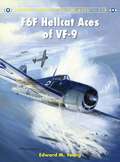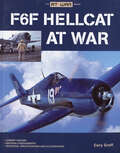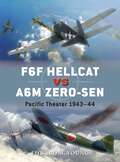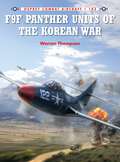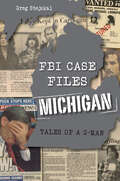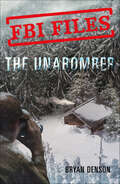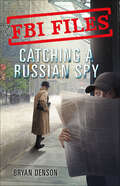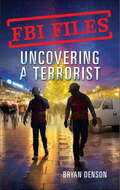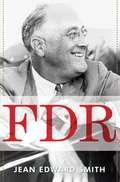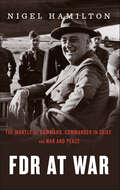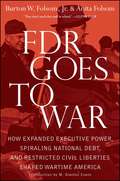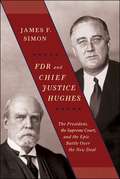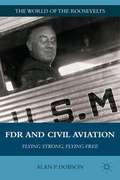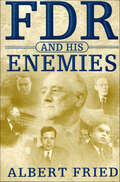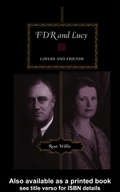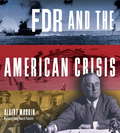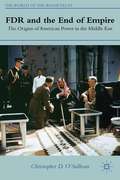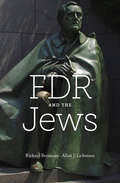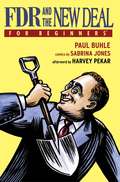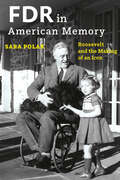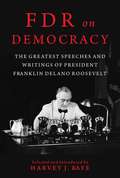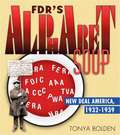- Table View
- List View
F6F Hellcat Aces of VF-9
by Jim Laurier Edward YoungAfter Pearl Harbor, the US Navy's VF-9 carrier fighter group formed, seeing action in North Africa, The Marshalls, Kwajelein, Truk, the Marianas Turkey Shoot and on to Tokyo and Okinawa.VF-9 was activated in March 1942 as part of Carrier Air Group (CAG) 9, one of the many air groups the US Navy was hurriedly forming in the aftermath of the Japanese attack on Pearl Harbor. Equipped with Grumman F4F Wildcats, VF-9 first saw combat during the Allied invasion of North Africa in November 1942, where the squadron engaged Vichy French fighters over Morocco. Returning to the United States, VF-9 became one of the first squadrons to receive the Grumman F6F Hellcat and to deploy on the USS Essex, the first of its class of fleet carriers that would form the backbone of the US Navy's Fast Carrier Task Force. VF-9, the Hellcat, and the Essex all entered combat in the fall of 1943. In the hands of the squadron's pilots, and with other Navy fighter squadrons, the Hellcat proved superior to the Imperial Japanese Navy's A6M Zero, which had heretofore been the world's premier carrier fighter plane. During its second combat tour, beginning in August 1943, VF-9 participated in the initial stages of the US Navy's successful island-hopping campaign across the Pacific. Flying strikes against Marcus Island, Wake Island, Rabaul, the invasions of Tarawa and Kwajalein, and the attack on Truk, VF-9 helped prove the Hellcat as a fighter and supported CAG-9 in its relentless attacks on Japanese forces, helping to validate the concept of the multi-carrier task force and the new carrier doctrine that led to the US Navy's complete defeat of the Imperial Japanese Navy. During its second combat tour VF-9 claimed 120 Japanese aircraft and produced the first Hellcat ace in Lt(jg) Hamilton McWhorter and nine additional aces. VF-9 began its third combat tour in February 1945 aboard the USS Lexington, shifting to the USS Yorktown a month later. The squadron participated in the February strikes against Tokyo and played a significant role in the Okinawa Campaign from March to June 1945. Now equipped with the F6F-5 Hellcat, the squadron claimed 130 Japanese aircraft shot down. Ten VF-9 pilots became aces during the campaign, most notably Lt Eugene Valencia, who ended the war as the second highest scoring Hellcat ace and tied with Lt Cecil Harris as the US Navy's second highest scoring ace overall with 23 victories. Valencia's division became famous as the most successful fighter team in the US Navy during World War 2, claiming a combined total of 43 Japanese aircraft. In addition VF-9 had one of the US Navy's few nightfighter aces in Lt(jg) John Orth, who flew an F6F-5N Hellcat.
F6F Hellcat at War (The At War Series)
by Cory GraffThis guide traces the history of the US Navy’s premier WWII fighter plane with archival photos, tech specs and illustrations.F6F Hellcat at War follows the story of this iconic aircraft from its early development to its distinguished combat career in the Pacific. While the F6F was not the fastest or most maneuverable fighter, aviators loved their trusty Hellcats because they were incredibly tough, marvelously powerful, and easy to fly. In the last two years of war, the Hellcat dominated the skies over the Pacific, stopping Japan’s once-vaunted A6M Zero and tallying a victory-to-loss ratio of over 19 to 1. Through compelling accounts, never-before-seen photographs, and detailed drawings, F6F Hellcat at War tells the story of one of the war’s most successful yet underappreciated fighter aircraft.
F6F Hellcat vs A6M Zero-sen
by Jim Laurier Edward YoungIn the key Pacific War battles of the Marianas Turkey Shoot, Leyte Gulf, and in and around Japan itself (from late 1943 through to VJ-Day) the principal fighters involved were the F6F Hellcat and the A6M5/7 Zero-sen. The former was Grumman's successor to the pugnacious Wildcat, and its creation was shaped by the combat experiences of Naval Aviators flying the F4F against the A6M2/3 Zero-sen from late 1941. Blooded in combat against the Japanese in August 1943, the Hellcat went on to serve as the principal US Navy fighter on board carrier decks until war's end. Despite its lethality in the air when ranged against the best Japanese fighters, the Hellcat still retained docile handling qualities around the carrier deck. Naval Aviators flying the Hellcat claimed in excess of 5,000 kills in the Pacific, and more than 300 pilots achieved ace status on the type. The majority of these victories took the form of A6M5 Zero-sens, the most-produced model of the final Mitsubishi fighter - some 6000 were built from late 1943 through to war's end. The A6M5 reached front-line units just as the Hellcat was making its combat debut, the new version of the Zero-sen being based on the previous A6M3 model but with modified flaps and ailerons and thickened wing skinning. It was only meant to be an interim design pending the arrival of the A7M Reppu and J2M Raiden. However, terminal development problems with the former and technical issues with the latter meant that the A6M5, and re-engined limited run A6M7 (150 built), had to hold the line through to September 1945. By now badly outclassed by the Hellcat, literally thousands of Zero-sens fell victim to US Navy fighter squadrons in the final years of the war.
F9F Panther Units of the Korean War
by Mark Styling Warren ThompsonIn 1948 the USAF, Marine Corps and US Navy were concentrating on converting over to an all-jet force. When the Korean War started in June 1950, the USAF had built up a sizable jet force in the Far East, while the US Navy was in the early stages of getting F9F Panthers operational as replacements for its piston-engined F8F Bearcats. At about this time, the Marine Corps had also begun using the Panthers in limited numbers. Operating from aircraft carriers off the Korean coast, F9Fs helped stop the North Korean invasion within two weeks of the communists crossing the 38th Parallel. The Panthers, escorting carrier-based AD Skyraiders and F4U Corsairs, penetrated as far north as Pyongyang, where they bombed and strafed targets that the North Koreans thought were out of range. The Panthers also took the battle all the way to the Yalu River, long before the MiG-15s became a threat. The F9F's basic tasking was aerial supremacy and combat air patrols, but they also excelled in bombing and strafing attacks. The Marine Corps, with its two Panther squadrons, was also involved in close air support and interdiction near the frontlines. There were a total of 32 Panther squadron deployments during the war, along with several special detachments that operated the F9F-2/5P unarmed photo-reconnaissance versions.
FBI Case Files Michigan: Tales of a G-Man (True Crime)
by Greg StejskalA retired Michigan FBI special agent recounts some of his biggest cases, including Jimmy Hoffa, the Detroit mob, and numerous grisly homicides. Across the Mitten and through the Upper Peninsula, the Wolverine State has witnessed some thrilling and historic federal cases. In Detroit, FBI agents took point investigating the kidnapping (and safe return) of a GM executive&’s son and in a manhunt for an armed killer in the north woods near Escanaba. The Bureau was called in to discover who poisoned patients at the Ann Arbor Veterans Hospital and for a grisly double homicide solved by a persistent and determined fingerprint examiner. Michigan agents spearheaded the first-ever investigation and prosecution of an Internet threat, and legendary football coach Bo Schembechler inspired an epic international undercover operation targeting the illegal distribution of steroids. Retired Special Agent Greg Stejskal recalls these stories and others from more than thirty years as a G-man in Michigan.
FBI Files: Agent Kathy Puckett and the Hunt for a Serial Bomber (FBI Files #1)
by Bryan DensonThe Unabomber is the story of the FBI's investigation of Ted Kaczynski, engineer of the most notorious bombing spree in U.S. history, and the agent who helped bring him to justice.The Unabomber was a lone-wolf terrorist who carried out fourteen bombings that left three people dead and another twenty-three injured. A cunning genius, he dodged his FBI pursuers for nearly two decades, terrifying Americans from coast to coast. Agent Kathy Puckett, a spy hunter and highly trained psychologist, served as the turning point in the FBI's efforts to understand the mind of the faceless killer. Her insights helped send more than a hundred agents to a remote cabin in the mountains of western Montana on April 3, 1996. Go behind the scences of some of the FBI's most interesting cases in award-winning journalist Bryan Denson's FBI Files series, featuring the investigations of Russian spy Rick Ames, al-Qaeda member Mohamed Mohamud, and Michael Young's diamong theft ring. Each book includes photographs, a glossary, a note from the author, and other detailed backmatter on the subject of the investigation.
FBI Files: Agent Leslie G. Wiser Jr. and the Case of Aldrich Ames (FBI Files #2)
by Bryan DensonCatching a Russian Spy is the story of the FBI's investigation of Aldrich Ames, CIA agent who turned Russian spy, and the agent who helped bring him to justice.Aldrich H. "Rick" Ames was a 31-year veteran of the CIA. He was also a Russian spy. By the time Ames was arrested in 1994, he had betrayed the identities of dozens and caused the deaths of ten agents. The notorious KGB (and later the Russian intelligence service, SVR) paid him millions of dollars. Agent Leslie G. “Les” Wiser, Jr. ran the FBI's Nightmover investigation tasked with uncovering a mole in the CIA. The team worked night and day to collect evidence—sneaking into Ames' home, hiding a homing beacon in his Jaguar, and installing a video camera above his desk. But the spy kept one step ahead, even after agents followed him to Bogota, Colombia. In a crazy twist, the FBI would score its biggest clue from inside Ames' garbage can.At the time of his arrest on February 21, 1994, he had compromised more highly-classified CIA assets than any other agent in history. Go behind the scences of some of the FBI's most interesting cases in award-winning journalist Bryan Denson's FBI Files series, featuring the investigations of the Unabomber, al-Qaeda member Mohamed Mohamud, and Michael Young's diamong theft ring. Each book includes photographs, a glossary, a note from the author, and other detailed backmatter on the subject of the investigation.
FBI Files: Agent Ryan Dwyer and the Case of the Portland Bomb Plot (FBI Files #3)
by Bryan DensonUncovering a Terrorist is the story of the FBI's investigation of Mohamed Mohamud led by Agent Ryan Dwyer, the agent who helped bring him to justice, creating room for the conversation surrounding religious terrorism and its effects around the world.Mohamed Osman Mohamud was an American citizen, a college student at Oregon State University, and a wannabe terrorist. His dream was to go to Yemen, train with al-Qaeda, and travel to Afghanistan to kill U.S. soldiers. But first, he plotted to detonate a massive bomb at a Christmas tree lighting ceremony in downtown Portland.Agent Ryan Dwyer ran the sting operation to see how serious Mohamed was. He and an Arabic-speaking partner, joined by FBI personnel—including two undercover operatives posing as al-Qaeda terrorists—worked month after month to get to know him and keep the people of Portland safe.Go behind the scences of some of the FBI's most interesting cases in award-winning journalist Bryan Denson's FBI Files series, featuring the investigations of the Unabomber, Russian spy Rick Ames, and Michael Young's diamong theft ring. Each book includes photographs, a glossary, a note from the author, and other detailed backmatter on the subject of the investigation.
FDR
by Jean Edward SmithOne of today's premier biographers has written a modern, comprehensive, indeed ultimate book on the epic life of Franklin Delano Roosevelt. In this superlative volume, Jean Edward Smith combines contemporary scholarship and a broad range of primary source material to provide an engrossing narrative of one of America's greatest presidents. This is a portrait painted in broad strokes and fine details. We see how Roosevelt's restless energy, fierce intellect, personal magnetism, and ability to project effortless grace permitted him to master countless challenges throughout his life. Smith recounts FDR's battles with polio and physical disability, and how these experiences helped forge the resolve that FDR used to surmount the economic turmoil of the Great Depression and the wartime threat of totalitarianism. Here also is FDR's private life depicted with unprecedented candor and nuance, with close attention paid to the four women who molded his personality and helped to inform his worldview: His mother, Sara Delano Roosevelt, formidable yet ever supportive and tender; his wife, Eleanor, whose counsel and affection were instrumental to FDR's public and individual achievements; Lucy Mercer, the great romantic love of FDR's life; and Missy LeHand, FDR's longtime secretary, companion, and confidante, whose adoration of her boss was practically limitless. Smith also tackles head-on and in-depth the numerous failures and miscues of Roosevelt's public career, including his disastrous attempt to reconstruct the Judiciary; the shameful internment of Japanese-Americans; and Roosevelt's occasionally self-defeating Executive overreach. Additionally, Smith offers a sensitive and balanced assessment of Roosevelt's response to the Holocaust, noting its breakthroughs and shortcomings. Summing up Roosevelt's legacy, Jean Smith declares that FDR, more than any other individual, changed the relationship between the American people and their government. It was Roosevelt who revolutionized the art of campaigning and used the burgeoning mass media to garner public support and allay fears. But more important, Smith gives us the clearest picture yet of how this quintessential Knickerbocker aristocrat, a man who never had to depend on a paycheck, became the common man's president. The result is a powerful account that adds fresh perspectives and draws profound conclusions about a man whose story is widely known but far less well understood. Written for the general reader and scholars alike,FDRis a stunning biography in every way worthy of its subject. From the Hardcover edition.
FDR
by Jean Edward SmithOne of today's premier biographers has written a modern, comprehensive, indeed ultimate book on the epic life of Franklin Delano Roosevelt. In this superlative volume, Jean Edward Smith combines contemporary scholarship and a broad range of primary source material to provide an engrossing narrative of one of America's greatest presidents.This is a portrait painted in broad strokes and fine details. We see how Roosevelt's restless energy, fierce intellect, personal magnetism, and ability to project effortless grace permitted him to master countless challenges throughout his life. Smith recounts FDR's battles with polio and physical disability, and how these experiences helped forge the resolve that FDR used to surmount the economic turmoil of the Great Depression and the wartime threat of totalitarianism. Here also is FDR's private life depicted with unprecedented candor and nuance, with close attention paid to the four women who molded his personality and helped to inform his worldview: His mother, Sara Delano Roosevelt, formidable yet ever supportive and tender; his wife, Eleanor, whose counsel and affection were instrumental to FDR's public and individual achievements; Lucy Mercer, the great romantic love of FDR's life; and Missy LeHand, FDR's longtime secretary, companion, and confidante, whose adoration of her boss was practically limitless. Smith also tackles head-on and in-depth the numerous failures and miscues of Roosevelt's public career, including his disastrous attempt to reconstruct the Judiciary; the shameful internment of Japanese-Americans; and Roosevelt's occasionally self-defeating Executive overreach. Additionally, Smith offers a sensitive and balanced assessment of Roosevelt's response to the Holocaust, noting its breakthroughs and shortcomings.Summing up Roosevelt's legacy, Jean Smith declares that FDR, more than any other individual, changed the relationship between the American people and their government. It was Roosevelt who revolutionized the art of campaigning and used the burgeoning mass media to garner public support and allay fears. But more important, Smith gives us the clearest picture yet of how this quintessential Knickerbocker aristocrat, a man who never had to depend on a paycheck, became the common man's president. The result is a powerful account that adds fresh perspectives and draws profound conclusions about a man whose story is widely known but far less well understood. Written for the general reader and scholars alike, FDR is a stunning biography in every way worthy of its subject.From the Hardcover edition.
FDR At War: The Mantle of Command, Commander in Chief, and War and Peace (Fdr At War Ser. #3)
by Nigel HamiltonThe definitive biography of FDR’s leadership during WWII, presented here in a single volume—”splendid . . . the memoir Roosevelt didn’t get to write” (New York Times Book Review).This groundbreaking, three-volume study of President Roosevelt’s role as Commander in Chief tells the story of World War II from his perspective. Using hitherto unpublished documents and interviews, Hamilton rewrites the famous account of Allied strategy given by Winston Churchill in his memoirs. Hamilton reveals, close-up and in dramatic detail, Roosevelt’s mastery of strategy, his vision, and how he overcame resistance from Churchill and his own generals to set the course for victory. Mantle of Command, Commander in Chief, and War and Peace have been celebrated as “masterly” (The Wall Street Journal).“A first-class, lens-changing work.” —James N. Mattis, former US secretary of defense
FDR Goes to War
by Burton W. Folsom Anita FolsomFrom the acclaimed author of New Deal or Raw Deal?, called "eye-opening" by the National Review, comes a fascinating exposé of Franklin Delano Roosevelt's destructive wartime legacy--and its adverse impact on America's economic and foreign policies today. Did World War II really end the Great Depression--or did President Franklin Roosevelt's poor judgment and confused management leave Congress with a devastating fiscal mess after the final bomb was dropped? In this provocative new book, historians Burton W. Folsom, Jr., and Anita Folsom make a compelling case that FDR's presidency led to evasive and self-serving wartime policies. At a time when most Americans held isolationist sentiments--a backlash against the stunning carnage of World War I--Roosevelt secretly favored an aggressive interventionist foreign policy. Yet, throughout the 1930s, he spent lavishly on his disastrous New Deal programs and slashed defense spending, leaving America vastly unprepared for Japan's attack on Pearl Harbor and the challenge of fighting World War II. History books tell us the wartime economy was a boon, thanks to massive government spending. But the skyrocketing national debt, food rations, nonexistent luxuries, crippling taxes, labor strikes, and dangerous work of the time tell a different story--one that is hardly the stuff of recovery. Instead, the war ushered in a new era of imperialism for the executive branch. Roosevelt seized private property, conducted illegal wiretaps, tried to silence domestic opposition, and interned 110,000 Japanese Americans. He set a dangerous precedent for entangling alliances in foreign affairs, including his remarkable courtship of Russian dictator Joseph Stalin, while millions of Americans showed the courage, perseverance, and fortitude to make the weapons and fight the war. Was Roosevelt a great wartime leader, as historians almost unanimously assert? The Folsoms offer a thought-provoking revision of his controversial legacy. FDR Goes to War will make America take a second look at one of its most complicated presidents.
FDR and Chief Justice Hughes
by James F. SimonThe author of acclaimed books on the bitter clashes between presidents and chief justices--Jefferson and Marshall, Lincoln and Taney--over the character of the nation, constitutional power, slavery, secession and the president's war powers, James F. Simon tells the dramatic story of the struggle between FDR and Chief Justice Charles Evans Hughes that decided the fate of the New Deal. The collision of Roosevelt and Hughes, like those of Jefferson and Marshall, Lincoln and Taney, occurred at a pivotal moment in American history. Roosevelt came to office in 1933 at the height of the Great Depression. He bombarded Congress with a fusillade of legislative initiatives that included shutting down insolvent banks, regulating stocks, imposing industrial codes, and rationing agricultural production. Major New Deal statutes, which Roosevelt considered critical to the nation's economic recovery, were struck down by the Hughes Court as unconstitutional. In 1936, FDR was reelected by a landslide and the exasperated president proposed legislation to relieve, he said, the overburdened and elderly justices of their heavy workload. He proposed the appointment of an additional justice for each sitting member over seventy years old. Six of the justices on the Hughes Court, including the Chief Justice, were over seventy. The proposal would have permitted the president to stack the Court with justices favorable to the New Deal. The Chief deftly rebutted the claim that the Court was not abreast of its work, and the proposal was defeated. In grudging admiration, FDR later said that the Chief Justice was the best politician in the country. Despite the defeat of his plan, Roosevelt never lost confidence and, like Hughes, never ceded leadership. He outmaneuvered isolationist senators to expedite aid to Great Britain as the Allies hovered on the brink of defeat. He then led his country through the Second World War to become the greatest president of the twentieth century.
FDR and Civil Aviation
by Alan P. DobsonThe aim of this study is to demonstrate that Franklin D. Roosevelt was one of the leading agents in both setting out and working to implement the principles that came to govern the international aviation system from 1945 down to the recent present and that much of its design was drawn from the experience of domestic US aviation reform in the 1930s. In contemporary parlance one might say that what is proposed here is the explanation of the genesis of a roadmap set out successively by Roosevelt's administrations for the achievement of a liberalized and lightly regulated international civil aviation market. Furthermore, a key contention of this research is that FDR himself played a much more important role in crafting policy than has previously been acknowledged.
FDR and His Enemies: A History
by Albert FriedNot since the Civil War was America so riven by conflict as it was during Franklin D. Roosevelt's presidency. His bold initiatives and his willingness to break historic precedent in handling the Great Depression and the coming of World War II were challenged by giant figures of the era, powerful public men each with their own fierce constituencies. Albert Fried brings out the tremendous drama in Roosevelt's ideological and personal struggle with five influential men: ex-New York governor and presidential candidate Al Smith, the enormously popular "radio priest" Charles E. Coughlin, Louisiana Senator Huey Long, labor champion John L. Lewis, and the universally adored aviator Charles A. Lindbergh. An enthralling story of a critical period in twentieth century history, FDR and His Enemies reveals the intellectual, moral, and tactical underpinnings of a great debate in which Roosevelt always triumphed.
FDR and Lucy: Lovers and Friends
by Resa WillisFirst Published in 2005. Routledge is an imprint of Taylor & Francis, an informa company.
FDR and the American Crisis
by Albert MarrinThe definitive biography of president Franklin Delano Roosevelt for young adult readers, from National Book Award finalist Albert Marrin, is a must-have for anyone searching for President's Day reading. Brought up in a privileged family, Franklin Delano Roosevelt had every opportunity in front of him. As a young man, he found a path in politics and quickly began to move into the public eye. That ascent seemed impossible when he contracted polio and lost the use of his legs. But with a will of steel he fought the disease—and public perception of his disability—to become president of the United States of America. FDR used that same will to guide his country through a crippling depression and a horrendous world war. He understood Adolf Hitler, and what it would take to stop him, before almost any other world leader did. But to accomplish his greater goals, he made difficult choices that sometimes compromised the ideals of fairness and justice. FDR is one of America&’s most intriguing presidents, lionized by some and villainized by others. National Book Award finalist Albert Marrin explores the life of a fascinating, complex man, who was ultimately one of the greatest leaders our country has known.
FDR and the End of Empire: The Origins of American Power in the Middle East (The World of the Roosevelts)
by Christopher D. O’SullivanBased upon extensive archival research in Great Britain, the United States, and the Middle East, including sources never previously utilized such as declassified intelligence records, postwar planning documents, and the personal papers of key officials, this is painstakingly researched account of the origins of American involvement in the Middle East during the Presidency of Franklin D. Roosevelt. It explores the effort to challenge British and French power, and the building of new relationships with Iraq, Iran, Saudi Arabia, Egypt, and the Levant states. It also reveals new and controversial discoveries about Roosevelt's views on Palestine, his relations with Middle East leaders, and his often bitter conflicts with Churchill and de Gaulle over European imperialism. Modern-day parallels make this story compelling for followers of current events, World War II, Franklin Roosevelt, the Middle East, or British imperialism.
FDR and the Jews
by Richard Breitman Allan J. LichtmanA contentious debate lingers over whether Franklin Delano Roosevelt turned his back on the Jews of Hitler’s Europe. FDR and the Jews reveals a concerned leader whose efforts on behalf of Jews were far greater than those of any other world figure but whose moral leadership was tempered by the political realities of depression and war.
FDR and the New Deal for Beginners®
by Paul BuhleA profusely illustrated, popularly-written volume with original comic art,FDR and The New Deal For Beginnerswill shed new light upon a story now regaining visibility thanks to the recent economic crisis and prominent reformer, President Obama, in the White House. The history of the precedent-making FDR administration through the bitter economic depression, with expansive programs empowering artists and working people, comes alive as the grandest social experiment in the history of American democracy. ...
FDR and the Spanish Civil War: Neutrality and Commitment in the Struggle that Divided America
by Dominic TierneyWhat was the relationship between President Franklin D. Roosevelt, architect of America's rise to global power, and the 1936-39 Spanish Civil War, which inspired passion and sacrifice, and shaped the road to world war? While many historians have portrayed the Spanish Civil War as one of Roosevelt's most isolationist episodes, Dominic Tierney argues that it marked the president's first attempt to challenge fascist aggression in Europe. Drawing on newly discovered archival documents, Tierney describes the evolution of Roosevelt's thinking about the Spanish Civil War in relation to America's broader geopolitical interests, as well as the fierce controversy in the United States over Spanish policy. Between 1936 and 1939, Roosevelt's perceptions of the Spanish Civil War were transformed. Initially indifferent toward which side won, FDR became an increasingly committed supporter of the leftist government. He believed that German and Italian intervention in Spain was part of a broader program of fascist aggression, and he worried that the Spanish Civil War would inspire fascist revolutions in Latin America. In response, Roosevelt tried to send food to Spain as well as illegal covert aid to the Spanish government, and to mediate a compromise solution to the civil war. However unsuccessful these initiatives proved in the end, they represented an important stage in Roosevelt's emerging strategy to aid democracy in Europe.
FDR in American Memory: Roosevelt and the Making of an Icon
by Sara PolakHow was FDR's image constructed—by himself and others—as such a powerful icon in American memory?In polls of historians and political scientists, Franklin Delano Roosevelt consistently ranks among the top three American presidents. Roosevelt enjoyed an enormous political and cultural reach, one that stretched past his presidency and across the world. A grand narrative of Roosevelt's crucial role in the twentieth century persists: the notion that American ideology, embodied by FDR, overcame the Depression and won World War II, while fascism, communism, and imperialism—and their ignoble figureheads—fought one another to death in Europe. This grand narrative is flawed and problematic, legitimizing the United States's cultural, diplomatic, and military role in the world order, but it has meant that FDR continues to loom large in American culture.In FDR in American Memory, Sara Polak analyzes Roosevelt's construction as a cultural icon in American memory from two perspectives. First, she examines him as a historical leader, one who carefully and intentionally built his public image. Focusing on FDR's use of media and his negotiation of the world as a disabled person, she shows how he consistently aligned himself with modernity and future-proof narratives and modes of rhetoric. Second, Polak looks at portrayals and negotiations of the FDR icon in cultural memory from the vantage point of the early twenty-first century. Drawing on recent and well-known cultural artifacts—including novels, movies, documentaries, popular biographies, museums, and memorials—she demonstrates how FDR positioned himself as a rhetorically modern and powerful but ideologically almost empty container. That deliberate positioning, Polak writes, continues to allow almost any narrative to adopt him as a relevant historical example even now.As a study of presidential image-fashioning, FDR in American Memory will be of immediate relevance to present-day readers.
FDR on Democracy: The Greatest Speeches and Writings of President Franklin Delano Roosevelt
by Harvey J. KayeFrom One of the Greatest Leaders in American History, a Collection of the Words and Writings that Inspired a Generation of Americans to Become the Greatest Generation In just under three decades of public life, Franklin Delano Roosevelt rose to become one of the greatest orators and leaders in American history. As the longest-serving US president, he guided the nation through two of the greatest challenges of the twentieth century—the Great Depression of the 1930s and the Fascist threat of the 1940s—and radically transformed American public life. In doing so, FDR created the conditions that enabled Americans to make the United States stronger, more prosperous, and more democratic than ever before for generations to come. Through his words—selected, annotated, and introduced here by writer and scholar Harvey J. Kaye—we rediscover the liberal and social-democratic vision and promise that FDR articulated so powerfully. We recall Roosevelt's efforts to redeem the challenge of the Declaration of Independence and renew the promise of equality and life, liberty, and the pursuit of happiness. We see him empower working people and make life more secure for more Americans. And we are reminded of his desire to not simply win the Second World War, but to create a nation and a world committed to the realization of the Four Freedoms—freedom of speech and worship, freedom from want and fear—indeed, to enact here in the United States a Second Bill of Rights, an Economic Bill of Rights for all Americans. In this collection of his greatest writings and speeches, we encounter the words that inspired and encouraged Americans to remember who they were and what they were capable of accomplishing—the words that helped turn a generation of Americans into the Greatest Generation. Now more than ever, we need to recall FDR's words. Now, when FDR's democratic legacy—the legacy of a generation—is under siege, we need to remind ourselves of who we are and what we need to do to make America freer, more equal, and more democratic.
FDR's Alphabet Soup: New Deal America, 1932-1939
by Tonya BoldenFDR’S New Deal, which followed the 1929 stock market crash, was a hugely influential moment in the history of the United States, encompassing everything from the arts to finance, labor to legislation, and some think it helped bring the country out of the Great Depression. Here, Tonya Bolden, writing in her trademark accessible style, creates a portrait of a time that changed American history both then and now. <P><P> FDR’s First 100 Days and how the United States was changed by it then are closely examined, especially now. The 2009 financial situation is eerily mirrored by that of the late 1920s, and this is a perfect book to help teens understand history and its lasting impact on current events.
